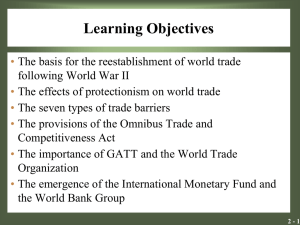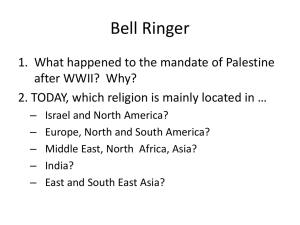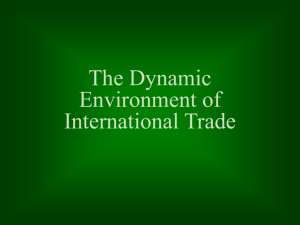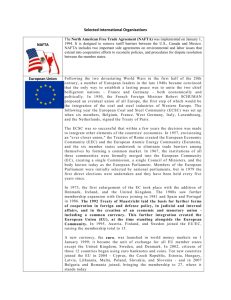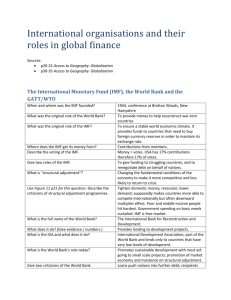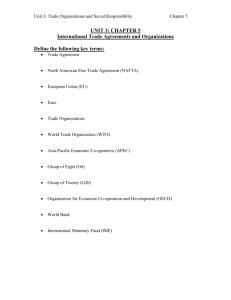International Monetary Fund (IMF) Organization and purpose
advertisement
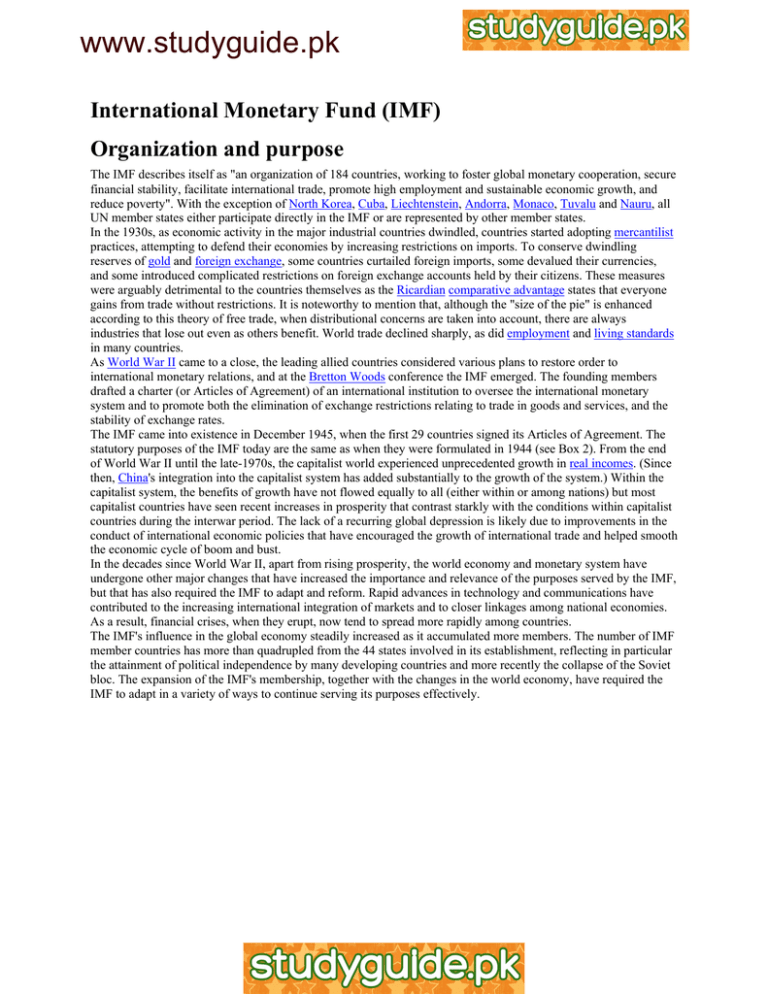
www.studyguide.pk International Monetary Fund (IMF) Organization and purpose The IMF describes itself as "an organization of 184 countries, working to foster global monetary cooperation, secure financial stability, facilitate international trade, promote high employment and sustainable economic growth, and reduce poverty". With the exception of North Korea, Cuba, Liechtenstein, Andorra, Monaco, Tuvalu and Nauru, all UN member states either participate directly in the IMF or are represented by other member states. In the 1930s, as economic activity in the major industrial countries dwindled, countries started adopting mercantilist practices, attempting to defend their economies by increasing restrictions on imports. To conserve dwindling reserves of gold and foreign exchange, some countries curtailed foreign imports, some devalued their currencies, and some introduced complicated restrictions on foreign exchange accounts held by their citizens. These measures were arguably detrimental to the countries themselves as the Ricardian comparative advantage states that everyone gains from trade without restrictions. It is noteworthy to mention that, although the "size of the pie" is enhanced according to this theory of free trade, when distributional concerns are taken into account, there are always industries that lose out even as others benefit. World trade declined sharply, as did employment and living standards in many countries. As World War II came to a close, the leading allied countries considered various plans to restore order to international monetary relations, and at the Bretton Woods conference the IMF emerged. The founding members drafted a charter (or Articles of Agreement) of an international institution to oversee the international monetary system and to promote both the elimination of exchange restrictions relating to trade in goods and services, and the stability of exchange rates. The IMF came into existence in December 1945, when the first 29 countries signed its Articles of Agreement. The statutory purposes of the IMF today are the same as when they were formulated in 1944 (see Box 2). From the end of World War II until the late-1970s, the capitalist world experienced unprecedented growth in real incomes. (Since then, China's integration into the capitalist system has added substantially to the growth of the system.) Within the capitalist system, the benefits of growth have not flowed equally to all (either within or among nations) but most capitalist countries have seen recent increases in prosperity that contrast starkly with the conditions within capitalist countries during the interwar period. The lack of a recurring global depression is likely due to improvements in the conduct of international economic policies that have encouraged the growth of international trade and helped smooth the economic cycle of boom and bust. In the decades since World War II, apart from rising prosperity, the world economy and monetary system have undergone other major changes that have increased the importance and relevance of the purposes served by the IMF, but that has also required the IMF to adapt and reform. Rapid advances in technology and communications have contributed to the increasing international integration of markets and to closer linkages among national economies. As a result, financial crises, when they erupt, now tend to spread more rapidly among countries. The IMF's influence in the global economy steadily increased as it accumulated more members. The number of IMF member countries has more than quadrupled from the 44 states involved in its establishment, reflecting in particular the attainment of political independence by many developing countries and more recently the collapse of the Soviet bloc. The expansion of the IMF's membership, together with the changes in the world economy, have required the IMF to adapt in a variety of ways to continue serving its purposes effectively. www.studyguide.pk World Trade Organization From Wikipedia, the free encyclopedia The World Trade Organization (WTO) is an international, multilateral organization, which sets the rules for the global trading system and resolves disputes between its member states, all of whom are signatories to its approximately 30 agreements. WTO headquarters are located in Geneva, Switzerland. Pascal Lamy is the current Director-General, taking over from the previous Director-General Supachai Panitchpakdi on September 1, 2005. As of December 15, 2005, there are 149 members in the organization [1] with the latest to join being Saudi Arabia. All WTO members are required to grant one another most favoured nation status, such that (with some exceptions) trade concessions granted by a WTO member to another country must be granted to all WTO members (WTO, 2004c). Since its inception in 1995, the WTO has been a major target for protests by the anti-globalization movement. See criticism. History The Bretton Woods Conference of 1944 proposed the creation of an International Trade Organization (ITO) to establish rules and regulations for trade between countries. The ITO charter was agreed at the UN Conference on Trade and Employment in Havana in March 1948, but was blocked by the U.S. Senate (WTO, 2004b). Some historians have argued that the failure may have resulted from fears within the American business community that the International Trade Organization could be used to regulate, rather than liberate, big business (Lisa Wilkins, 1997). Only one element of the ITO survived: the General Agreement on Tariffs and Trade (GATT). Seven rounds of negotiations occurred under GATT before the eighth round - the Uruguay Round - concluded in 1995 with the establishment of the WTO as the GATT's replacement. The GATT principles and agreements were adopted by the WTO, which was charged with administering and extending them. Unlike the GATT, the WTO has a substantial institutional structure. Mission The WTO aims to increase international trade by promoting lower trade barriers and providing a platform for the negotiation of trade and to resolve disputes between member nations, when they arise. The goal is to help producers of goods and services, exporters, and importers conduct their business. Principles of the trading system The WTO discussions should follow these fundamental principles of trading. 1. A trading system should be discrimination-free in a sense that a country cannot favour another country or discriminate against foreign products or services. 2. A trading system should be more free where there should be little trade barriers (tariffs and non-tariff barriers). 3. A trading system should be predictable where foreign companies and governments can be sure that trade barriers would not be raised and markets will remain open. 4. A trading system should be more competitive. 5. A trading system should be more accommodating for less developed countries, giving them more time to adjust, greater flexibility, and more privileges.
